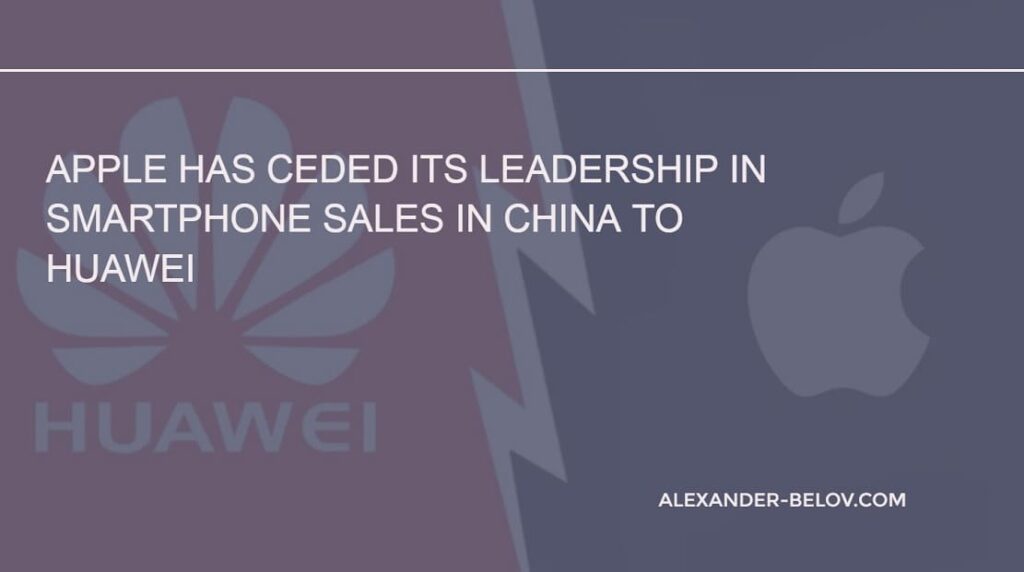Apple has ceded its leadership in smartphone sales in China to Huawei
In a surprising turn of events, Apple has conceded its leadership position in the Chinese smartphone market to Huawei, according to a report by Jefferies. For the first time, Huawei’s smartphone sales have surpassed those of Apple’s iPhone in China. Experts attribute this shift to weaker demand for Apple’s latest iPhone 15 lineup compared to its predecessor, the iPhone 14. As a result, Apple’s smartphone sales in China have experienced a significant double-digit decline year-on-year. On the other hand, there has been a high consumer demand for Huawei’s latest smartphone series, the Mate 60, in the country. The experts believe that Apple’s dethronement as the market leader in China can be attributed to political tensions between Beijing and Washington, as well as the increasing competition in the Chinese smartphone market.

Meanwhile, on Monday, analysts at Morgan Stanley lowered their target price for Apple’s shares from $215 to $210, anticipating potential supply issues for the new iPhones in the current quarter.
As the Chinese smartphone market continues to evolve and grow exponentially, the competition between Apple and Huawei has intensified. For years, Apple held a dominant position in China, with its iPhones being highly coveted by Chinese consumers. However, recent developments have given rise to a new leader in the market, Huawei.
The weakening demand for Apple’s latest iPhone 15 lineup has come as a surprise to many industry experts. After the success of the iPhone 14, which witnessed strong sales and positive reception from Chinese consumers, the underperformance of its successor has raised concerns within the company. The reasons behind this decline in demand can be attributed to various factors, including the ongoing political tensions between the United States and China.
The deteriorating relationship between Beijing and Washington has had a significant impact on several industries, including the smartphone market. As both countries engage in trade disputes and impose tariffs on each other’s goods, Chinese consumers have started to show a preference for domestic brands over international ones. This shift in consumer sentiment has favored Huawei, which has established itself as one of the leading Chinese smartphone manufacturers.
In addition to the geopolitical factors, the growing competition in the Chinese smartphone market has also played a crucial role in Apple’s fall from the top spot. Not only does Huawei offer a wide range of feature-packed smartphones, but the company has also invested heavily in marketing and branding efforts. This has helped Huawei gain a loyal customer base in China, who eagerly await the release of the latest Mate series.
The success of Huawei’s Mate 60 lineup can be attributed to its innovative features, competitive pricing, and a strong focus on meeting the demands of Chinese consumers. With advanced camera technology, powerful processors, and a sleek design, the Mate 60 has captured the attention of tech enthusiasts and casual users alike. Furthermore, Huawei’s strategic partnerships with local retailers and network providers have ensured a wider distribution network, making its smartphones easily accessible to consumers across China.
In response to Huawei’s rise to the top, Apple is now faced with the challenge of regaining its lost market share in China. With analysts lowering their target price for Apple’s shares due to potential supply issues, the company needs to address its shortcomings and rekindle the excitement among Chinese consumers. This may involve launching innovative products specifically tailored to the preferences of the Chinese market and strengthening its brand presence in the country.
In conclusion, Apple’s loss of leadership in the Chinese smartphone market to Huawei marks a significant shift in the industry landscape. The weaker demand for Apple’s latest iPhone 15 lineup, coupled with political tensions and increasing competition, has propelled Huawei to the forefront. As the battle for dominance continues, it will be interesting to see how Apple responds and whether it can reclaim its position as the leader in China’s ever-evolving smartphone market.



